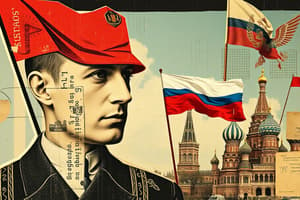Podcast
Questions and Answers
Political freedom includes the right to run for office and participate in the political process.
Political freedom includes the right to run for office and participate in the political process.
True (A)
Freedom of speech protects all types of speech without any restrictions.
Freedom of speech protects all types of speech without any restrictions.
False (B)
Social justice primarily focuses on creating a fair distribution of resources and opportunities.
Social justice primarily focuses on creating a fair distribution of resources and opportunities.
True (A)
Civil liberties are basic rights that are not protected from government interference.
Civil liberties are basic rights that are not protected from government interference.
Personal autonomy is related to the ability to make informed decisions about one's own life.
Personal autonomy is related to the ability to make informed decisions about one's own life.
Advocacy in social justice means promoting activism for social change.
Advocacy in social justice means promoting activism for social change.
The First Amendment protects the right to express opinions and ideas only in private settings.
The First Amendment protects the right to express opinions and ideas only in private settings.
Consent is crucial for ensuring personal autonomy in interactions and relationships.
Consent is crucial for ensuring personal autonomy in interactions and relationships.
Political freedom refers exclusively to the freedom to express personal opinions.
Political freedom refers exclusively to the freedom to express personal opinions.
Freedom of speech is limited by laws regarding hate speech and incitement to violence.
Freedom of speech is limited by laws regarding hate speech and incitement to violence.
Social justice aims to promote equality and fairness across different societal sectors.
Social justice aims to promote equality and fairness across different societal sectors.
Civil liberties provide individuals with rights that are not subject to government intervention.
Civil liberties provide individuals with rights that are not subject to government intervention.
Personal autonomy allows individuals to choose their life paths without external constraints.
Personal autonomy allows individuals to choose their life paths without external constraints.
Study Notes
Freedom
Political Freedom
- Definition: The right to participate in the political process, including voting and running for office.
- Key Concepts:
- Democracy: A system of government where power is vested in the people.
- Civil Rights: Legal provisions that protect individuals' freedoms from infringement by governments and private organizations.
- Importance: Essential for maintaining representation, accountability, and the protection of individual rights in society.
Freedom of Speech
- Definition: The right to express opinions and ideas without fear of government retaliation or censorship.
- Key Concepts:
- First Amendment (U.S.): Protected speech in public discourse, media, and assembly.
- Limitations: Speech that incites violence, defamation, and obscenity can be restricted.
- Importance: Facilitates open dialogue, promotes transparency, and is fundamental for democracy.
Social Justice
- Definition: The pursuit of a fair and just society by addressing inequalities and ensuring equal rights for all.
- Key Concepts:
- Equity: Fair distribution of resources and opportunities.
- Advocacy: Activism aimed at promoting social change and affirming rights.
- Importance: Contributes to the overall freedom of individuals by fostering inclusive environments and addressing systemic barriers.
Civil Liberties
- Definition: Basic rights and freedoms that are guaranteed to individuals, typically protected from government interference.
- Key Concepts:
- Individual Rights: Freedom of religion, privacy, and protection from discrimination.
- Legal Protections: Enshrined in constitutions or laws (e.g., Bill of Rights).
- Importance: Protects citizens from abuse of power by the state, ensuring personal freedoms.
Personal Autonomy
- Definition: The capacity to make an informed, uncoerced decision about one's own life.
- Key Concepts:
- Self-Determination: The ability to control personal choices and life directions.
- Consent: Fundamental in interactions and relationships, emphasizing respect for individual choices.
- Importance: Vital for mental health, dignity, and overall freedom, fostering a sense of agency and responsibility.
Political Freedom
- The right to participate in the political process, including voting and running for office.
- Democracy: A system of government where power is vested in the people.
- Civil Rights: Legal provisions that protect individuals' freedoms from infringement by governments and private organizations.
- Important for maintaining representation, accountability, and the protection of individual rights in society.
Freedom of Speech
- The right to express opinions and ideas without fear of government retaliation or censorship.
- First Amendment (U.S.): Protected speech in public discourse, media, and assembly.
- Limitations: Speech that incites violence, defamation, and obscenity can be restricted.
- Facilitates open dialogue, promotes transparency, and is fundamental for democracy.
Social Justice
- The pursuit of a fair and just society by addressing inequalities and ensuring equal rights for all.
- Equity: Fair distribution of resources and opportunities.
- Advocacy: Activism aimed at promoting social change and affirming rights.
- Contributes to the overall freedom of individuals by fostering inclusive environments and addressing systemic barriers.
Civil Liberties
- Basic rights and freedoms that are guaranteed to individuals, typically protected from government interference.
- Individual Rights: Freedom of religion, privacy, and protection from discrimination.
- Legal Protections: Enshrined in constitutions or laws (e.g., Bill of Rights).
- Protects citizens from abuse of power by the state, ensuring personal freedoms.
Personal Autonomy
- The capacity to make an informed, uncoerced decision about one's own life.
- Self-Determination: The ability to control personal choices and life directions.
- Consent: Fundamental in interactions and relationships, emphasizing respect for individual choices.
- Vital for mental health, dignity, and overall freedom, fostering a sense of agency and responsibility.
Political Freedom
- Includes the right to run for office and participate in political processes.
- Not exclusively about expressing personal opinions.
Freedom of Speech
- Protects all types of speech without restrictions.
- Not limited to private settings.
- Limited by laws regarding hate speech and incitement to violence.
Social Justice
- Focuses on fair distribution of resources and opportunities.
- Promotes equality and fairness across societal sectors.
- Advocacy plays a role, promoting activism for social change.
Civil Liberties
- Basic rights that are not protected from government interference.
- Provide individuals with rights that are not subject to government intervention.
Personal Autonomy
- Ability to make informed decisions about one's own life.
- Consent is crucial for personal autonomy in interactions and relationships.
- Allows individuals to choose their life paths without external constraints.
Studying That Suits You
Use AI to generate personalized quizzes and flashcards to suit your learning preferences.
Description
Test your understanding of key concepts related to political freedom, freedom of speech, and social justice. Explore the definitions and implications of democracy, civil rights, and the importance of open dialogue in a democratic society. This quiz is essential for anyone interested in the principles that uphold individual rights and representation.




